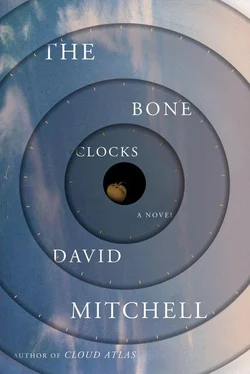“Marinus, it’s Esther on … June 7, 1984. Before we all assemble in Gravesend, I’ve taken a little trip to Trondheim. Nice town. Not a lot going on. Very white — a taxi driver just asked what part of Africa I’m from.” I hear her cackle slightly as she lights a cigarette. “But listen, I got glimpses of the Script, Marinus, about the First Mission. Sketchy and vague, to be sure, but I see fire … flight … and death. Death in the Dusk, and death in a sunny room. If the Script is accurate, I’ll survive, in a manner of speaking, but I’ll need a bolt-hole. I’ll need asylum. It has to be hidden and locked, so when the Anchorites come looking for me, as Constantin will, they’ll miss it. This means I’ll need you to get me out again. I’ll have to get the key to you.” I hear a vitreous rumbling noise, and guess that Esther moved an ashtray across a table. “The Script showed me tombs among the trees, and this name: ‘Blithewood.’ Find it and go there, as soon as you can. You’ll meet someone you know. That person gave me asylum. There are many locks, but already I sent you a sign to tell you which lock the key’ll fit. Find that lock, Marinus. Open it. Bring me back from the dead.” I hear the muffled chimes of an ice-cream van in that Norwegian summer. “Your hearing this cassette is a trigger. An enemy will make a proposal, very soon. Hide this sign. Hide this box. He’s very close to you already. The Script doesn’t say if you can trust him or not. His proposal’ll be the seed of the Second Mission. Things’ll move quickly now. In seven days the War will be over, one way or the other. If all goes well, we’ll meet before then. Until then, then.” Clunk.
The recording ends, the tape hisses, I press stop. I’m pummeled by guesses, half guesses, and questions. My friends and I have always believed that Esther’s soul succumbed to its injuries after killing Joseph Rhîmes and redacting Holly Sykes’s memory. How else to explain the absence of contact from Esther since 1984? This cassette flags up a dramatic alternative, however. That after the First Mission, Esther’s soul unraveled to a critical, yet not quite fatal, degree. She then sought asylum deep inside an unknowing host, concealed so that no Shaded Way hunter guided by the Counterscript could find and kill her. And that by presending my keys and signs, I could locate and liberate her reraveled soul from its asylum, after forty-one years. This is so slim a hope as to be anorexic. Sentience dissipates after only a few hours in another’s parallax of memories. After so many years of incorporeality, would Esther’s soul even know its name?
I watch Iris Fenby’s reflected face in the window-framed Kleinburg woods. The thickish lips, the flattish nose, the short curly black hair, silvered ever so slightly by middle age. These woods are remnants of the old forest that covered Ontario for most of the Holocene Era. The trees’ war against subdivisions, agro-forestry, sixlane highways, and golf courses is more or less lost. Could Esther Little still be alive? I don’t know. I just don’t know. Esther had command of the Aperture, so why not seek asylum with an Horologist? Because that was too obvious, perhaps. What about the last part of Esther’s message? “An enemy will make a proposal, very soon”? “He’s very close to you already”? It’s midnight in a shielded, bulletproofed house in a well-to-do rural retreat on the northwest fringes of Toronto, forty-one years in the future from the day that Esther spoke the words preserved on this magnetic tape. Even for a precognitive Horologist, it beggars belief that she could accurately have foreseen—
• • •
MY DEVICE TRILLS on my lamp stand. Before I answer an instinct makes me hide my parcel from Norway behind some books. My device can’t identify the caller. It’s late. Should I answer? “Yes?”
“Marinus,” says a male voice. “It’s Elijah D’Arnoq.”
I’m shocked by the contact, though after Hugo Lamb’s call in Vancouver, I shouldn’t be. “This is … certainly a surprise.”
A dead silence. “I imagine it must be. I’d feel the same.”
“ ‘Imagine’? ‘Feel’? You flatter yourself.”
“Yeah.” D’Arnoq’s voice is pensive. “Maybe I do.”
Keeping low, I unplug the lamp from the wall so I’m not visible from outside. “I don’t want to seem rude, D’Arnoq, but would you skip to the bit where you gloat about Oscar Gomez, so I can just hang up? It’s late and, as you know, I’ve had a long day.”
A troubled, sloughing silence. “I want it to stop.”
“Stop what? This call? Fine by me. Goodbye—”
“ No , Marinus — I want to defect.”
I check the last sentence for errors.
D’Arnoq repeats it like a sulky kid: “I want to defect.”
“So I say, ‘Really?’ and you say, ‘In your dreams.’ When I last attended high school, it went something like that.”
“I can’t … can’t endure another decanting. I want to defect.”
Stranger than the Anchorite’s words is his tone, denuded of the usual swagger. But I’m still a light-year from swallowing this. “Well, D’Arnoq,” I say, “now you’re au fait with the arts of feeling and imagining, try this: If you were on my end of the device, how would you respond to this show of remorse from a high-up Anchorite?”
“I’d be bloody skeptical. I’d ask, ‘Why now?’ ”
“What an excellent place to begin. Why now?”
“It’s not now. It’s a … nausea that’s grown over the last … twenty years. But I can’t ignore it anymore. I … I … Look, last year, Rivas-Godoy, the Tenth Anchorite, sourced a five-year-old from Paraisópolis, a favela in São Paolo. Enzo was the kid’s name. Enzo had no dad, he was bullied, friendless, his chakra-eye was vivid, and Rivas-Godoy became his big brother … A textbook sourcing. I did the ingress-check and Enzo was pure, no sign of Horology. So I approved him, and was in the Chapel for the Rebirthday when Rivas-Godoy walked Enzo up …”
I’ve bitten back five acidic interruptions already.
“… to meet Santa Claus.” There’s a grimace in D’Arnoq’s voice.
“Santa Claus. Caucasian male. About sixty. Nonexistent.”
“Yeah. Enzo’d been picked on for saying Santa might be real. So Rivas-Godoy told Enzo he’d take him to Lapland. So the Way of Stones became the short cut to the North Pole, the Chapel was Santa’s dining room, and the view over the Dusk, that was … Lapland. Enzo’d never left his favela, so”—D’Arnoq lets out a sigh through his teeth—“he didn’t know any better. Rivas-Godoy said I was the vet in case the reindeer got sick. Enzo said, ‘Wow.’ Then Rivas-Godoy told Enzo, ‘Go see Santa’s papa, Enzo, in the painting. It’s a magic talking picture, go say hello.’ The last minute of Enzo’s life was the happiest one, I suppose. But later, on the Solstice Rebirthday, as we drank the Black Wine, and Rivas-Godoy was laughing about this dumb-ass Brazilian kid … I could hardly empty my glass.”
“But somehow you managed, of course.”
“I’m a high-ranking Anchorite! What choice did I have?”
“Step out of the Aperture halfway down Mariana Trench? You’d cure your guilt, contribute to the local aquafauna, and spare me your oh-so-shiny crocodile tears.”
D’Arnoq’s whisper is broken. “The decanting has to stop.”
“Enzo the São Paolo boy must’ve been truly cute. You ought to know, by the way, I’m not sure how secure this device—”
“I’m our hacker-in-chief, nobody can hear us. It wasn’t just Enzo. Or Oscar Gomez, today. It’s all of them. Since the day Pfenninger told me of the Blind Cathar, and what he built, and what it does, I’ve been party to … Look, if you need me to use the word ‘evil,’ I’ll use it. I anesthetized myself against it, of course. I ate the lies. I digested the whole ‘What’s four a year out of eight billion?’ schtick … But I’m sick of it. Of the sourcing, of the grooming, of the murder, of the animacide. Sick of the evil. Horology’s right. You always were.”
Читать дальше












